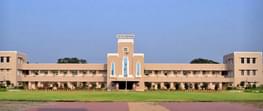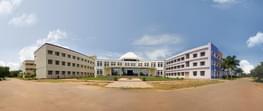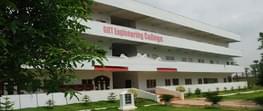Dr. M. Sreenivasa Reddy is the Principal at Aditya Engineering College. He has obtained his B.E from KDK College of Engineering and M.Tech from J.N.T.U Anantapur. He has 21 years of experience and has a membership in five institutes. He has attended many workshops and seminars. He has 10 patents and 6 Books/Book Chapters published. His main areas of interest include Engineering Drawing, Engineering Mechanics, Fluid Mechanics, Refrigeration and Air Conditioning and Thermal Engineering.

You have held key positions at education institutes throughout your professional career. What are the key factors that keep you connected with the education sector?
Higher education has rapidly grown during the past decade. The size of the institutions became larger, posing new challenges in the areas of teaching-learning, skill- development etc., Many of these challenges are addressed with the advancement of technology. Moreover, institutes are tending towards accreditations (NBA, NAAC etc.,). Outcome-based education became an integral part of higher education. However, faculty and students are to be oriented toward Outcome-based education. This helps in improving the education system as a whole, as faculty and students are major stakeholders. Still there is a lot of room for development in education technology, accreditations and Outcome-based education. These are the key factors that keep me connected with the education sector.
Being the Principal of Aditya Engineering College what is your philosophy of leadership? How would you describe your leadership style?
Leadership is about attaining the targeted heights personally and then encouraging other peers to attain them. Personally, I feel that every individual should be encouraged towards capacity building. Understanding individuals is another key aspect of leadership. Understanding the problems of individuals and supporting them in every aspect will help them perform better. A broad outlook towards life is required for this.
The education systems in India and other foreign countries are structured very differently. In your experience, what can an inbound student gain from studying here in your institute?
Of course, the education system in India and other foreign countries is structurally different, but the difference is gradually reducing. With the advent of the National Educational Policy-2020 (NEP-2020), We are slowly aligning towards the foreign education system. We at Aditya Engineering College follow innovative teaching practices and educational technology with a vision to provide globally acceptable education. The curriculum is a blend of learner-centric features like Self-learning through MOOCs, Minor degrees, Gap years, Semester Internships, Community Service Projects, etc., and core courses. These features will help the students in their pursuit of academic and vocational interests.
Further, the Institute programs are accredited by the National Board of Accreditation (NBA) under Tier-1 allows the recognition of student academic degrees by the universities abroad.
Check Aditya Engineering College Scholarship
What are some of the biggest challenges you see, both for higher education in general and for Aditya Engineering College specifically?
The cost of higher education is increasing day by day but, the salary offered to most of the graduates is not on par. Parents are spending lakhs of rupees towards higher education but the returns are not satisfactory. Onboarding of most of the students, who got placements in various companies, is being delayed a lot. If this scenario continues, people lose interest and will invest less in higher education. Personally, I feel that this is the biggest challenge for the higher education sector.
What are some plans that you’re currently (or will be) designing for Aditya Engineering College International Affairs and/or students?
The institute has had foreign students enrolled for a long back. Since then, we are catering to the needs of foreign students and helping them to pursue their academic interests. The institute has foreign students from Nepal, Nigeria, Namibia, Kuwait, Sudan, Bhutan, Congo, Zimbabwe, and Bangladesh. The campus is inclusive and provides equal opportunities for varied categories of students, protection of their rights and full participation in academic and non-academic activities. The positive reciprocation from graduated students has enhanced the goodwill and in turn, increased the inflow of students from foreign countries.
What would you like people to know about your institute they may not know?
The institution promotes a learner-centered approach in accordance with the Outcome-based Education (OBE) principles. Throughout the course of study, each student receives individual attention. The institute uses a systematic approach to help slow learners and advanced learners improve their skills. Apart from regular academics, students are provided training on various technologies through the in-house training division Technical Hub. This enables the students to become industry-ready and provides a competitive edge to them. Students also take part in the National Service Scheme (NSS) and National Cadet Corps (NCC) which imbibes the values of service to humanity and the nation. Sportsmanship is encouraged in the institute as well as extra-curricular activities through various technical and hobby clubs are also prioritized. Overall, the institute wants a student to grow holistically.
How do you tend to establish a healthy relationship and environment in your institute?
The institute has well-defined processes for Governance, Grievance redressal, Anti- Ragging, Gender Equity, Personal health etc., We also have a properly defined code of conduct for employees as well as students. Annual sensitization on these aspects and constant monitoring help us to create an amicable working environment.

![Aditya Engineering College - [AEC]](https://image-static.collegedunia.com/public/college_data/images/logos/1591109396Annotation20200602201850.jpg?h=71.7&w=71.7&mode=stretch)











![Aditya College Of Engineering and Technology - [ACET]](https://image-static.collegedunia.com/public/college_data/images/appImage/15251_app image aditya.png?h=111.44&w=263&mode=stretch)



![Kakinada Institute of Technology and Science - [KITS]](https://image-static.collegedunia.com/public/college_data/images/appImage/28530_KITS.jpg?h=111.44&w=263&mode=stretch)














![Aditya Engineering College - [AEC]](https://image-static.collegedunia.com/public/college_data/images/logos/1591109396Annotation20200602201850.jpg?h=72&w=72&mode=stretch)








 (1).png?h=72&w=72&mode=stretch)
.jpeg?h=72&w=72&mode=stretch)
.png?h=72&w=72&mode=stretch)
.png?h=72&w=72&mode=stretch)

![GMR Institute of Technology - [GMRIT]](https://image-static.collegedunia.com/public/college_data/images/logos/1479966276logo.png?h=72&w=72&mode=stretch)
![Godavari Global University - [GGU]](https://image-static.collegedunia.com/public/college_data/images/logos/1708510162channels4profile.jpg?h=72&w=72&mode=stretch)
![Aditya College Of Engineering and Technology - [ACET]](https://image-static.collegedunia.com/public/college_data/images/logos/1480059954logo 564.png?h=72&w=72&mode=stretch)
![Vishnu Institute of Technology - [VIT]](https://image-static.collegedunia.com/public/college_data/images/logos/1480310942logo.png?h=72&w=72&mode=stretch)
![Gudlavalleru Engineering College - [GEC]](https://image-static.collegedunia.com/public/college_data/images/logos/1417412725zoutons-online-coupons.png?h=72&w=72&mode=stretch)
![Sagi Ramakrishnam Raju Engineering College - [SRKR ]](https://image-static.collegedunia.com/public/college_data/images/logos/1697801139logo1.png?h=72&w=72&mode=stretch)
![Anil Neerukonda Institute of Technology & Sciences - [ANITS]](https://image-static.collegedunia.com/public/college_data/images/logos/1591266477Logo.jpg?h=72&w=72&mode=stretch)


![Vignan's Institute of Information Technology - [VIIT]](https://image-static.collegedunia.com/public/college_data/images/logos/148007135655.jpg?h=72&w=72&mode=stretch)
![Lakireddy Bali Reddy College of Engineering - [LBRCE]](https://image-static.collegedunia.com/public/college_data/images/logos/1417085821LOGO123.jpg?h=72&w=72&mode=stretch)

![Raghu Engineering College - [REC]](https://image-static.collegedunia.com/public/college_data/images/logos/1480399520newnew logo.jpg?h=72&w=72&mode=stretch)
![Sri Vasavi Engineering College - [SVEC]](https://image-static.collegedunia.com/public/college_data/images/logos/1480324648vasavi logo.gif?h=72&w=72&mode=stretch)
![Prasad V. Potluri Siddhartha Institute of Technology - [PVPSIT]](https://image-static.collegedunia.com/public/college_data/images/logos/1738573649logocollege.png?h=72&w=72&mode=stretch)

Comments